Willy Wenger's Family Chronicle
The following is the continuation of the family history written by Willy Wenger that first appeared on March 14 under the title “the great hope: the German Reich.” Wenger was born in 1926 in Styria in the diminished independent nation of Austria, 'victim' of the Paris Peace Conference following WWI. Willy had a loving father and mother, and an older brother Leopold (named after their father) with whom he was very close. From the time Leopold Jr. first began to speak, he was called “Bibi” (a mispronounciation of Bubi by the child), a nickname that took hold with family and friends all the way through high school and beyond.
The Referendum of April 10th, 1938
By Willy Wenger
copyright 2013 Wilhelm Wenger and Carolyn Yeager
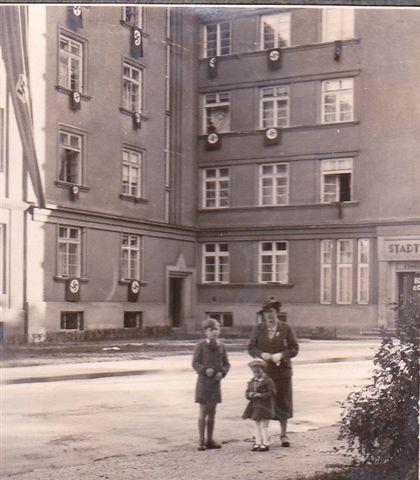
Willy, Gretl and their mother standing in front of their apartment building on Referendum Day.
Several months ago we had moved from the Timmerdorfer-Straße to Dreierschützenstraße No.16 where we had a larger apartment that belonged to the municipality. It consisted of a kitchen, a pantry, a small room – a cabinet, as we call it in Austria – with two beds, and a spacious loggia opening on a large garden in the inner part of the massive block. There was also a large living room, and the parents bedroom, as well as a hall and the toilet. Gretl slept in a small bed in the parents' bedroom, while Bibi and I shared the cabinet. Our building accommodated the municipal baths, which had bath tubs and showers which we used frequently.
Election Day was Sunday, April 10, 1938, on Dad's 45th birthday. Many had predicted that the referendum would be a big success for the N-S regime, and with the end result, all doubts were gone: the people decided and the result was convincing. Never in history has there been such a clear result: In Leoben, the vote was 99.83 per cent in favor – the proof of the willingness of the Ostmark to join the German Reich.
This result may be difficult to understand today, after so many decades have passed; especially the youth of today can hardly imagine the situation at that time. For us old folks, it's understandable. Our generation was not one bit dumber, but the time was totally different and the votes in favor of the referendum show the strength of the faith of millions, and our idealism.
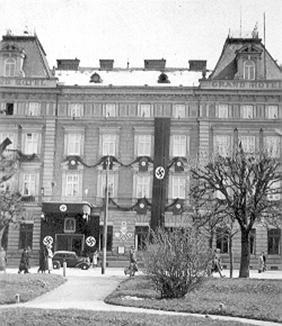
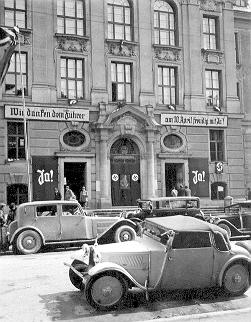
The Grand Hotel and other public buildings in Leoben decorated for the referendum.
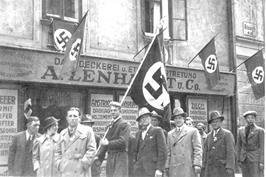
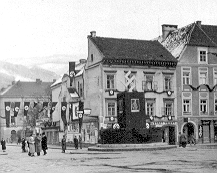
Left: The employees of Lenhardt & Co. (including Leopold Wenger Sr. third from left) demonstrate their approval for the unification (Anschluss) in front of the company office.
May 1st was also celebrated as never before. "Work ennobles" was the saying from now on. The various companies organized outings, usually with the traditional raising of the Maypole. Dad went with the entire staff of the branch of his company, Lenhardt & Co., to Bruck where they celebrated with other colleagues at the company's headquarters. It's interesting to look at these pictures today. Almost everyone wears a hat, unlike now. Of course, the May Day was dominated by the new regime: swastika flags were everywhere.
On the first of May, according to the old tradition, a fertility Maypole is raised. The ancient custom remained strong in our area, but is also maintained in some areas of Germany. According to ancient tradition, a young spruce, at least 30 meters in height, is cut down in the morning hours of the 30th April. After the so-called "Schäpsen" (removal of the branches ), the tree must be "geschäpst" (debarked) according to tradition, so the evil spirits and witches cannot hide under the bark, dressed as beetles. The green top of the tree is preserved because, according to tradition, that is where the gods live. Wreaths symbolize the female element which is penetrated by the male element, the stem. The top of the maypole is decorated with colorful ribbons.
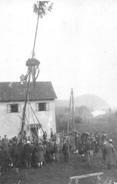
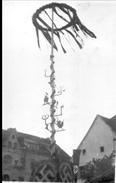
Mayday 1938 company celebraton at A. Lendhardt & Co.
In some areas, figures representing artisans and farmers are placed at the top, too. Robust youths watch over it during the night to prevent theft of the tree by young people from the neighboring villages. On May 1st the tree is slowly raised up and secured with the help of long poles, which can sometimes take up to two hours. The tradition forbids the use of technical equipment for raising the Maypole. In some places, full bottles of wine are attached to the wreath and the stem is smeared with soft soap to impede climbing the trunk by bold fellows.
But this time the celebrations of the 1st of May also became a meeting of various National Socialist organizations, with parades and a lot of march music, in which all the people participated with excitement. But above all, there was a lot of dancing. The boys and girls wore their gorgeous costumes which gave the popular dance “Bandeltanz” an especially attractive, colorful appearance.
For the youth, tent camping was great fun
During the holidays, we went to the tent camp. It was great fun; we all loved the camp life. Once, we were at the famous Green Lake where I with the “Pimpfen” set up camp on a stream that flowed out directly from the icy green lake near Tragöß. The lake is emerald green and swells after snow-melt to several meters. The water was clear and clean, but … bitterly cold! And yet, we tried to harden ourselves and swam a short distance in the terribly icy waters. We cooked for ourselves and in the adjacent forest there were many games and competitions.
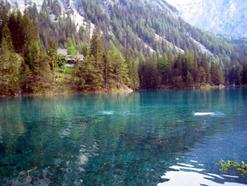
Grünen See, Styria's emerald-colored frigid-water lake
Another time we took part in a major annual gathering of Upper Styrian Hitler Youth at St. Michael. Their camp had new, large round white tents. Early in the morning there was a roll call and the camp flag was solemnly hoisted, accompanied by fanfares and drums. The young people always had a lot of black flags with the symbol of the “Pimpfe,” while the older boys had large banners with the emblem of Hitler Youth. Every group (Gefolgschaft) had their own drums and fanfares which gave their entry into the camp a solemn character. In the evening there was usually campfire; we crowded around it, singing happy songs. We all had a great time and regretted when it was time to leave these adventurous camps.

St. Michael Upper Styrian Hitler Youth campground, an annual event
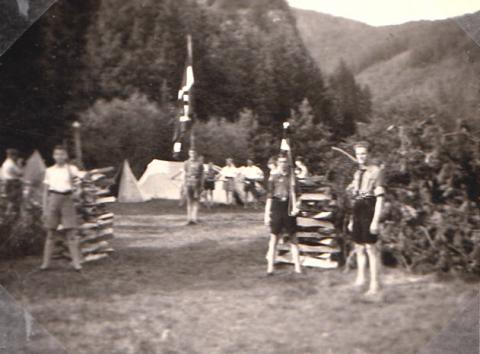
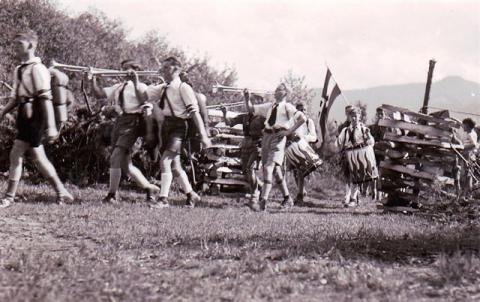
"Every group (Gefolgschaft) had their own drums and fanfares which gave their entry into the camp a solemn character."
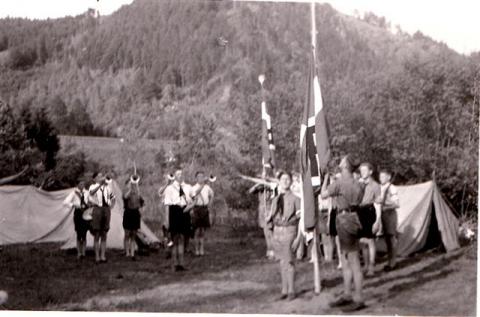
"Early in the morning there was a roll call and the camp flag was solemnly hoisted, accompanied by fanfares and drums."
We have all grown together into a single community and talked a lot with each other. Even at school, we now had a much closer relationship both with our classmates and the superiors, the entire faculty. One no longer had the feeling of suppression. We could understand one another and enjoy ourselves with the teachers, while still respecting each other. Due to the fact that we now had girls in the class, we were less rowdy.
In the fall, we now and then got a few days off from school, sent by the H-J to help the farmers bring in the harvest – and do other necessary work in the barn or in the field – everywhere we helped with great zeal. It was always pleasant work, and afterward the farmer served a powerful, nutritious meal that we were always excited about in advance.
Life at home amid a patriotic population
As already mentioned, we lived in the Dreierschützenstraße, named after the soldiers of the Mountain Infantry Regiment, which was located just a few doors from us in the Leobner barracks. I liked to observe them at drills. These Alpine troops had smaller horses, pack animals that carried gun barrels on their sides, and wheels for the guns and ammunition boxes. I distinctly remember an incident that has remained in my memory. One of the soldiers was kicked by a horse in the lower abdomen. He was obediently signed off by his superior before he lost consciousness and fell down. That gave me a respect for horses. Ever since, I have always made a big circle around these animals.
Our building bordered on a very large corner house where the district headquarters of the NSDAP in the district of Leoben had its head office. Before the Anschluss it had been the seat of the Austrian Fatherland Front. Now, there was more lively activity there which we watched from the living room window. From here we also saw the square in front of the church and the railway bridge which spanned the river Mur flowing near-by, and the railway station.
One day my school colleague Helmut Terlep told me: "Your mother is going to have a baby." He had recognized it through her waist circumference (he later became a doctor). I had not known it nor noticed. But there is a history to it. Adolf Hitler had some time earlier stressed in a speech that a German family must have at least four children. And these words appear to have been taken very seriously by many people. I knew a few families who had not had children for several years and now, suddenly, came the "laggards" into the world in 1939. The same happened at the Holzers. Our youngest brother, Wolfgang Gerhard, was also born in 1939.
Bibi was quite engaged in the Hitler Youth. He had many friends from the illegal time, with whom he spent happy hours. In the meantime he had become Gefolgschaftsführer, bringing with it more commitments. He also visited several camps, especially during the school holidays. Dad took me very often on bicycle tours around the Leoben area. He had a small seat on the handlebars, so that Gretl could always accompany us. Mom preferred to stay at home. In the fall, Bibi traveled, this time by train, to the NSDAP Rally at Nuremberg which he had visited by bicycle in the previous year as an illegal Hitler Youth. This time, his friend Gilbert, who was a party member, went with him.
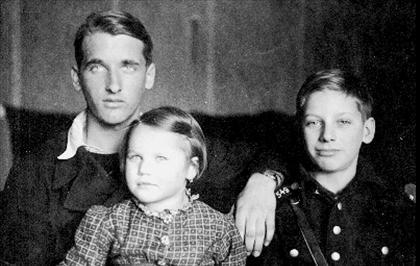
We are three good friends: Bibi, Gretl and Willy
Like Bibi, Dad was always busy as a political leader in the local party organization of Leoben. He had to supervise the entire block in which we lived. Besides, he had, like many businessmen, also registered for technical self-defense and assisted with their missions. The Technical Emergency (TN) was a kind of voluntary firefighting organization. The men joined together in emergencies, catastrophes, supported the firefighters and helped the farmers where it was necessary. In Leoben, the TN had two motor vehicles: a truck and a terrain car, similar to the later "Haflinger," only bigger. It was an event when Dad, who was the driver of the off-roader, brought this vehicle to the garage located in a courtyard in the Gösserstrasse. He had to drive about 10 steps up, which in the middle of the city was not fun. Dad had to collect the modern vehicle in central Germany, so it was fortunate that he had gotten a driving license some years previous at the company where he now had a senior position. He only had to take an additional test for off-road driving.
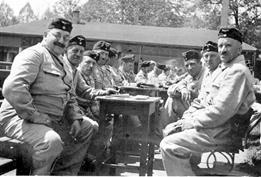
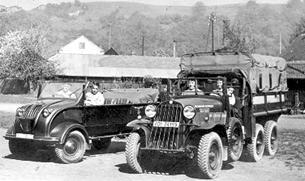
Dad is 3rd on the right of the Technical Emergency (TN) volunteers for quick assistance, and the driver of the small terrain vehicle at left, both owned by the TN.
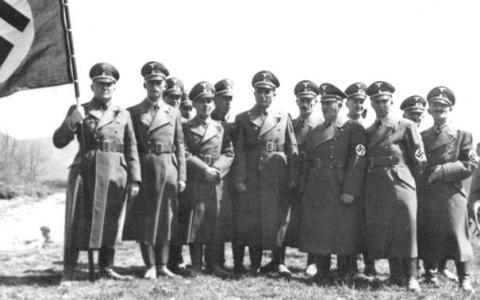
Leopold Wenger Sr. stands in the center of the local political group in 1938
1939 and the Napola School
The political situation deteriorated in the course of 1939
In the New Year we had a lot to learn in school. Along with Latin we had to cram also for English. Our professor was a younger man, Mr. Molterer, whom we also had for sports lessons. It was a time when our behavior was quite boisterous. Once, some classmates had smeared the sliding chalkboard at the edges with curd cheese that smelled quite strongly ... Prof. Molterer took it in a stride and said that when he was in high school they had played much worse jokes. Of course, this was the reason that some of the rascals brought a few stink bombs into the classroom and the stench was really brutal. As a consequence, we had to stay behind.
Another time, one had placed a piece of wood on the top edge of the classroom door. Of course, it hit our class teacher, Pessl, directly in the head and again it meant detention. We had another teacher who, at the beginning of class, quick as lightning tore open the door and literally rushed in. We clowns lifted the door off its hinges and left it leaning. When he grabbed the door to come in, the door fell with a loud bang and the "urgent teacher" stood with both feet on the classroom door.
Bibi's best friend, Gilbert Geisendorfer, also a Gefolgschaftsführer in H-J at this time, showed Bibi an ad in the Styrian Tagespost in which a German national educational institution in Pomerania was appealing to young Ostmark boys. The advertisement invited the boys to report for an entrance exam in Berlin. The two comrades deliberated and said, "We will present ourselves, and if we fail the test, well, then at least we have seen the capital.” Thus said and done, they sent in their applications, went to Berlin, passed the entrance exams and stayed in the old German Reich. In this way did they come to the Napola. It was a National Socialist educational institution, but kind of a secret military academy for the training of Air Force officers.
On June 10, 1939 my brother Gerhard saw the light of day in the hospital of the miners in Seegraben. Now we were a real German family – reason enough for Mutti to get a Mother's Cross (shown right).
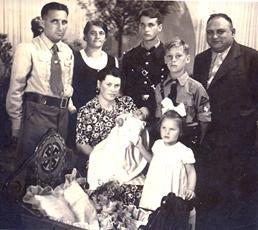

We celebrate the naming of Gerhard: Standing from left: Father, Mrs. Baschlberger, Bibi, Willy, Uncle Emil. Seated: Mother with Gerhard and Gretl.
Now, the roles were reversed again: Gerhard was in the center around which everything in the family revolved. Bibi learned of this birth in Köslin and was very happy to have a new little brother, as he expressed in his letters again and again. Finally, he was able to come during the summer holidays to Leoben for the official naming ceremony (instead of a baptism). Gerhard got a second first name, Adolf, to honor the instigator of his existence.
On June 27, 1939 Bibi went with his classmates, the so-called Jungmänner (young men), to a glider course in Rositten on the Curonian Spit in East Prussia. On this 98 km-long peninsula with high sand dunes, next to a world-famous bird observatory, is a Reich-gliding school. The route of the railway there led through the Polish Corridor, which stood for some time at the focal point of political dispute between Poland and the German Reich, and should be recognized as one of the causes of the outbreak of World War II. At Danzig, they crossed the border. The cars were locked, but the uniforms of the Hitler Youth with the swastika bands often aroused displeasure in the Polish workers along the railway line. In their arrogance, the young chaps certainly provoked the Poles by displaying their armbands from the car windows. And the Poles took turns threatening, cursing loudly and waving their fists in the air.
The weeks in Rositten were very nice. They had to pass the "B-test" for gliders. The aircraft SG 38 and Grunau Baby were pulled by a motorized winch to the necessary altitude and flight students learned to fly curves, circles and eights. Bibi reported that for the first time he was able to see moose that live there in the wild – from the air. The beaches were gorgeous, with their high sand dunes. In their spare time they went on searches for the yellow amber, and Bibi brought us some small pebbles. The trip back through the corridor was similar to the journey there. Just eight weeks later the Second World War began here. Bibi then spent several weeks in Leoben. But still wanting to get some spare change, he wanted to work and Dad took him into his company as a roofing worker, which was probably hard labor, but at least it gave him a little extra money which he could always use.
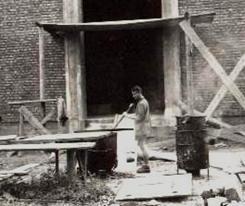
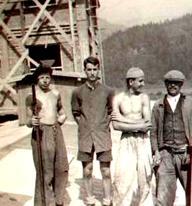
Bibi chooses to work for Dad as a laborer during school holiday, in full summer heat.
In late August Bibi returned to Köslin and was now in the graduating class. We often got his letters and I found it always of great interest to read his reports. After the glider stage he needed, like all these young men, to get a driver's license for motorcycles and cars. For this purpose they took a course in a Pomeranian town (Dramburg). I was very impressed by all this. At that time, the only connection we had was by the mail. We could communicate only through letters; almost no private person had a telephone. For birthdays, we sent and received congratulations by telegram. Thus, we were forced to exercise patience.
In the floodplain near Leoben we held our evenings for the Jungvolk, and here we had our parade ground. Once, one of the Hitler Youth leaders asked me to take over the leadership of a youth group. Under his oversight, I had to command, "Stand still,” then "dismissed," then "to the left or right, look to the left", etc. I felt like an artist who is teaching his puppets to dance. As the whole team had to do it in unison, everything suddenly seemed so unnatural. It seemed so funny that I laughed after each command because the young men were dancing to my tune. I think I must have made a very ridiculous figure. I don't seem to have been created to be a tamer of a youth squad.
We followed the conference in Munich in the newsreels at the cinema. We saw the pictures of the entry of the German troops in the Sudetenland, of the occupation of Czechoslovakia, of the declaration of a German protectorate and we were thrilled that our Führer united these countries into the Greater German Reich. We were convinced that Danzig also had to be occupied. All the former territories which had been taken by the Treaty of Versailles from the German Reich were again being united. All these occupations were widely welcomed, especially as it went without bloodshed. Now we wanted East Prussia, which was like an island separated from the Reich, to be at least connected with the mainland by a corridor, which of course was met with violent resistance in Poland.
The situation became precarious and ultimately led to the start of World War II. Hitler pushed into Poland on the 1st of September 1939. Just two days later, on 3rd September, Britain declared war on the German Reich and France joined in ... and not vice versa, as is often falsely said. The war was actually forced on the German people, which many often do not want to admit today. So stupid not even Hitler could be to want to engage in a two-front war. On the contrary, he tried all means to keep the Allies, especially England, out of the war. In the back of his mind he was already thinking about the crackdown on and destruction of Bolshevism, and an expansion of the German Reich in the East (after Germany was deprived by the Treaty of Versailles of all its colonies).
Hitler was aware that the German Reich never would recover these colonies. But he always flirted with the idea of expanding the German Reich to the east. The war with Poland probably seemed a welcome opportunity to carry out his plans. And subsequently, he expected to destroy Bolshevism quickly. But he wanted by all means to prevent war with the Western powers Britain and France – definitely not to engage in a war on two fronts, which for a logical thinker should be understandable.
Therefore, the surprising declaration of war by the British and French governments on 3 September 1939 met with incomprehension, because all the previous diplomatic negotiations suggested rather an understanding of the Western powers, especially of Britain, with Germany. One need only read about the agreement at a conference in Munich, where Chamberlain expressed loudly his enthusiasm for Germany and Hitler and then proudly presented the agreement to the world. It is now known that Hitler had a friendly correspondence with the Duke of Windsor, the abdicated former British king. As late as August 1939, the Swedish industrialist B. Dahlerus, a personal friend of Hermann Göring, made several trips to London to negotiate with the British government to smooth the exchange of views and enable the rapprochement to the German Reich. It was widely known that Rudolf Hess had an English wife and thus excellent relations to the English aristocracy. Therefore, the German people could not understand the declaration of war by the British Government.
The Second World War has, contrary to all promises of "no more war,” broken out!
Category
Adolf Hitler, European History, Germany, National Socialism, World War II- Printer-friendly version
- 5426 reads









